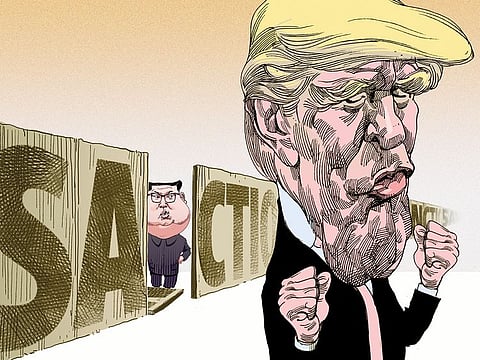US sanctions against North Korea are not working
Diplomacy, economic assistance, military signalling can make Pyongyang fall in line

Recently US President Donald Trump tweeted that he ordered the “withdrawal” of North Korea sanctions. It is still unclear whether he pulled back an upcoming package of North Korea sanctions or ones that had been announced just the day before. And although he didn’t explain his reasoning, Sarah Sanders offered that he cancelled the sanctions because “President Trump likes Chairman Kim, and ... doesn’t think these sanctions will be necessary.”
This policy-swerve-by-tweet reflects a chaotic national security process. But it also lays bare a broader problem with the Trump administration’s approach to sanctions: Despite their extensive use against North Korea, Russia and Venezuela, sanctions are not working particularly well to solve any of the national security challenges.
The problem is not a lack of effort by the Treasury Department, which has been churning out innovative sanctions at a breakneck pace. But sanctions are not an elixir that magically achieve desired foreign policy outcomes.
Having had the opportunity to oversee our sanctions efforts for several years, I’m convinced that at least three conditions are essential for sanctions to work. First, sanctions must be deployed in service of a clearly articulated and attainable policy objective. If the goal is muddled or impossible to achieve, sanctions will not gain traction.
Second, sanctions must be used alongside other tools for projecting US power, including diplomacy, economic aid and assistance, and military signalling. Sanctions alone rarely accomplish much.
And third, sanctions work best when they are amplified by complementary actions by international partners that share the policy objective. Although the US dollar and financial system — the key levers that make our sanctions powerful — dominate international trade and finance, we live in an interdependent world. If others, particularly major economies, seek to circumvent our sanctions, there are ways to do so.
In North Korea, the Trump administration fails on all three prongs. There is no clearly articulated policy objective — are we seeking “the final, fully verified denuclearisation of North Korea,” or can we all “sleep well” now that the threat has been neutralised because of the personal relationship between Trump and Kim Jong Un? Moreover, there is no whole-of-government effort to achieve this policy, not since Trump unilaterally stood down on military exercises and enfeebled his diplomats by making clear that only he alone could negotiate with Kim.
And there is, today, little in the way of international sanctions support. The multilateral pressure that had been building in 2017 was undermined initially by Trump’s declaration last June that “There is no longer a nuclear threat from North Korea,” and then weakened further when Trump surprised his Treasury Department with his impulsive tweet rescinding sanctions.
All messed up
Trump’s Russia policy is a jumbled mess. Congress has legislated harsh sanctions and the Treasury Department boasts that it has “conducted a robust and prolonged campaign to counter the full range of Russian malign activity.” The president, however, has proved himself unwilling or incapable of pushing back on Russia, whether for its election interference here, its unlawful incursion into Ukraine, or its support for Syria’s Bashar Al Assad. Put simply, sanctions in service of a muddled policy do not work.
Finally, Venezuela is something of a mixed bag. The United States is calling for regime change. But as in Iran, the Trump administration has not brought other countries — including, notably, Russia, China and India — on-board the effort. Although there is little doubt that US sanctions are exacerbating the dreadful economic situation in Venezuela, it is hard to imagine President Nicols Maduro relinquishing power to relieve the sanctions pressure. The Maduro regime may fall, but if it does, the Trump administration’s sanctions are unlikely to be the cause.
The extensive use of unilateral sanctions in pursuit of unclear or unattainable goals is more likely to diminish the power of sanctions, as other countries develop workarounds that avoid the dollar and the US financial system. That is especially a danger when sanctions are imposed or withdrawn based on the whims of a president who falls in and out of love with US sanctions’ targets.
— Washington Post
David Cohen is the former deputy director of the CIA and US undersecretary of the treasury for terrorism and financial intelligence.



